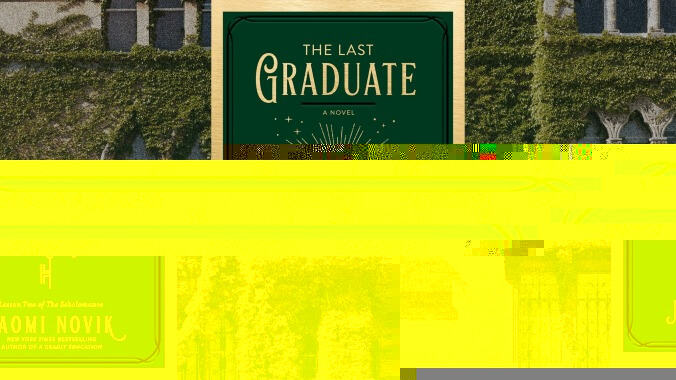The system is the monster in Naomi Novik’s engaging The Last Graduate
The second book in Novik's Scholomance series sees her deepen the social themes that powered 2020’s A Deadly Education

It’s very difficult to talk about Naomi Novik’s Scholomance series—the second installment of which, The Last Graduate, arrives September 28—without the words “Harry Potter” eventually slipping into the conversation. The surface-level comparisons between Novik’s YA-friendly blend of fantasy and horror, and J.K. Rowling’s paper-devouring juggernaut, are obvious: the magical academy stocked with under-supervised teenagers, the chosen one who spends his time saving classmates from enchanted threats, the dark wizards lurking around every corner. But the contrasts are also stark enough to demand comment, most especially the central striking aspect that separates Novik’s tightly focused novels from Rowling’s billionaire sprawl: They’re actually about something.
The Last Graduate drops readers, once again, into the mind and voice of teen witch El, now a senior at the lethally dangerous magic school that lends the series its name. Although El’s growing magical powers are now offering some added protection from the murderous, soul-sucking monsters who infest the school—and which made last year’s A Deadly Education such a bracing mix of horror, black comedy, and teen drama—she’s still got a major worry looming over her head: the year-end “Graduation” ceremony, which sends the scant survivors of any given academic class racing through a gauntlet of quasi-Lovecraftian beasts hoping to squeeze in a few more student-shaped snacks in before the kids can escape into the relative safety of adulthood.
This year’s Graduation is expected to be especially nasty, in part due to El—whose uncommonly powerful combat magic comes with a whole host of apocalyptic prophecies hanging over her head—but mostly thanks to the books’ battle-damaged Potter stand-in, Orion Lake, who spends all of his free time saving his fellow students and eviscerating every monster he sees. See, the Scholomance operates with the grim understanding that more than half of any given graduating class (usually those from poorer or less well-connected backgrounds, who have fewer people watching their backs or shared resources to draw from) will have been torn apart by “mals” by the time they reach the end of their final semester, or at least have had their meager magical stockpiles burnt through by the effort to stay alive. By keeping an uncommonly high percentage of their classmates alive over the past three school years, El and Orion have toppled that typical balance of power, starved the ravenous hordes below, and paved the way for things at the Scholomance to change forever.
If you’re detecting the telltale whiff of subtext in the above paragraph, then you’ve stumbled into one of Novik’s key aims with this series, which begins with its viewpoint character immersed in a mindset that says survival is a matter of hoarding scarce resources in the face of a cruel and all-consuming threat, and which sees her slowly come to realize that the system itself is the actual existential threat. That Novik can build this thesis organically, without El ever drawing any explicit parallels (she’s too busy trying to survive to meditate on real-world economic or political realities), only underscores the points she manages to artfully make about altruism, transactional relationships, and tribalism. To put it another way, it’s a socialist wizards narrative built entirely on the magic of show, don’t tell—a pretty sharp contrast to the Potter books’ largely aimless optimism.
All this and it features a solid will-they/won’t-they plotline and the same sharp world-building and narrative voice that made A Deadly Education such a delight. Admittedly, the focus on El coming into her power robs some of The Last Graduate of the desperation that made its predecessor so hooky; by rendering the main character’s situation less horrific through personal growth, Novik saps the sequel of some of its, well, horror. But for fans who devoured the first book (or Novik’s earlier, updated takes on classic folk tales, Uprooted and Spinning Silver), her ability to combine pointed commentary with one of the more engaging first-person narrators in recent memory ensures the sophomore Scholomance book will be as refreshing, if slightly less harrowing, as the first.
Author photo: Beth Gwinn